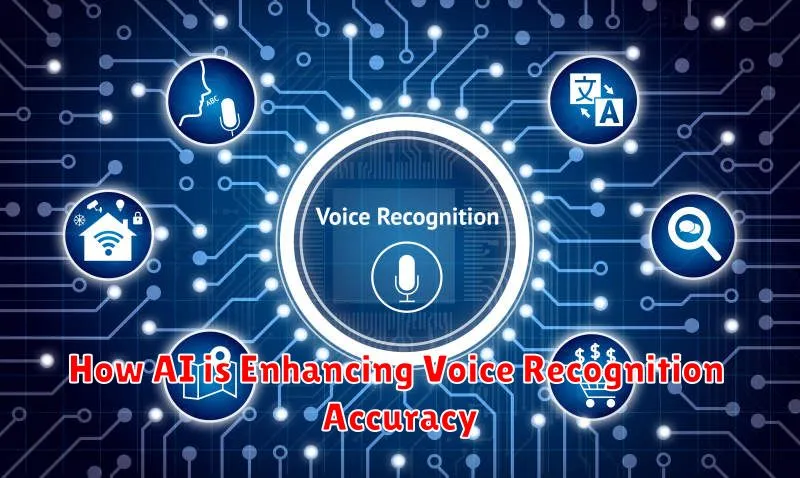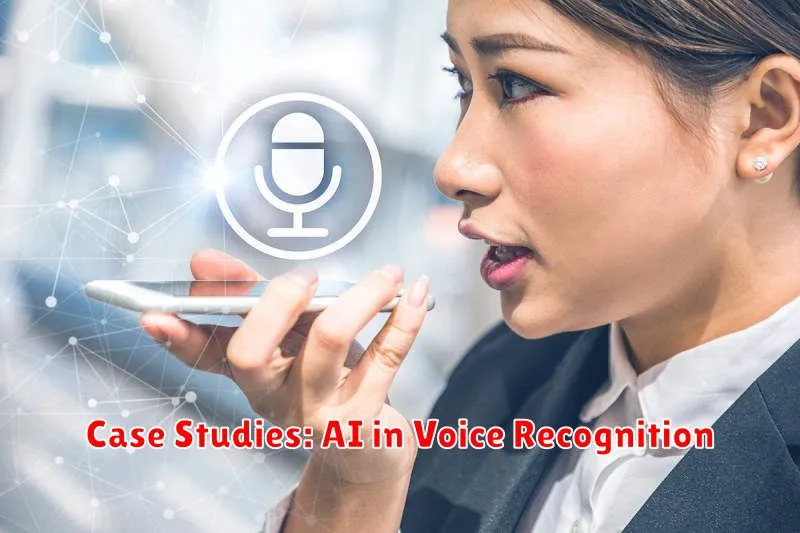The rise of artificial intelligence (AI) has revolutionized many aspects of our lives, and voice recognition technology is no exception. AI algorithms are rapidly transforming how we interact with devices, making voice control more accurate, natural, and accessible than ever before. From voice assistants like Siri and Alexa to speech-to-text software and personalized recommendations, AI is driving the advancement of voice recognition technology, leading to a future where our voices become our primary interface with the digital world.
This article explores the profound impact of AI on voice recognition technology. We’ll delve into how AI algorithms are enhancing accuracy, personalizing experiences, and expanding the capabilities of voice recognition systems. We’ll also examine the exciting possibilities for the future, including the development of more natural and intuitive voice interactions, the integration of voice recognition into diverse applications, and the ethical considerations surrounding this rapidly evolving field.
How AI is Enhancing Voice Recognition Accuracy

Voice recognition technology has come a long way, and Artificial Intelligence (AI) is playing a crucial role in this advancement. AI algorithms are constantly learning and improving, leading to significant enhancements in accuracy and efficiency.
One of the primary ways AI enhances voice recognition accuracy is through deep learning. Deep learning models are trained on vast datasets of speech, enabling them to identify patterns and nuances in human speech. This allows them to understand different accents, dialects, and even background noise with greater accuracy.
Furthermore, AI enables adaptive learning, where the system continuously improves based on user interactions. This means that as the system is used more frequently, it learns to better understand the user’s voice, vocabulary, and speaking patterns. This personalized approach leads to even more precise recognition.
AI also plays a vital role in noise reduction. By employing advanced algorithms, AI can filter out unwanted sounds, such as background noise or other voices, improving the clarity of the speech signal. This significantly enhances the accuracy of voice recognition, particularly in noisy environments.
In addition to these benefits, AI is also being utilized to develop natural language processing (NLP) capabilities in voice recognition systems. This allows the system to understand the context and meaning behind spoken words, going beyond simple transcription to deliver more comprehensive and intelligent responses.
The Future of Voice Assistants with AI
The integration of Artificial Intelligence (AI) is dramatically reshaping the landscape of voice recognition technology. AI’s ability to learn and adapt, combined with its sophisticated language processing capabilities, is propelling voice assistants to new heights of sophistication and utility.
AI-powered voice assistants are becoming increasingly adept at understanding complex language nuances, accents, and even background noise. This enhanced comprehension paves the way for more natural and intuitive user interactions. With AI’s help, voice assistants can now engage in more meaningful conversations, providing personalized responses and tailored advice.
Beyond basic commands, AI enables voice assistants to perform increasingly complex tasks. They can now manage calendars, book appointments, control smart home devices, and even provide personalized recommendations based on individual preferences. AI is fueling the evolution of voice assistants into powerful personal assistants capable of handling a wide range of tasks.
The future of voice assistants is bright, with AI at the helm. As AI technology continues to evolve, we can anticipate even more advanced features, including:
- Enhanced emotional intelligence: Voice assistants will become more attuned to user emotions, providing empathetic and comforting responses.
- Predictive capabilities: AI will anticipate user needs, proactively offering assistance and recommendations before they are even requested.
- Multi-modal interactions: Voice assistants will seamlessly integrate with other devices and platforms, providing a truly unified user experience.
The integration of AI is transforming voice assistants into indispensable tools for enhancing our daily lives. With their ability to learn, adapt, and understand our needs, AI-powered voice assistants are poised to become even more ubiquitous and integral to our digital world.
Challenges in Implementing AI-Powered Voice Recognition
While AI has significantly advanced voice recognition technology, implementing AI-powered voice recognition systems presents several challenges:
Data Requirements: AI models require massive datasets of labeled voice recordings for training. Acquiring and labeling such datasets can be costly and time-consuming, especially for niche languages or dialects.
Noise and Background Interference: Real-world environments are often noisy, with background conversations, music, or other distractions. AI models must be robust enough to filter out these interferences and accurately transcribe the intended speech.
Accents and Dialects: Different accents and dialects can significantly alter the pronunciation of words, posing a challenge for AI systems trained on a specific accent. Developing models that can handle diverse accents and dialects is crucial for broader adoption.
Privacy Concerns: Voice recordings contain sensitive personal information. Ensuring the privacy and security of user data is paramount, especially with increasing concerns about data breaches and misuse.
Ethical Considerations: The potential for bias in AI models trained on biased datasets is a significant concern. It’s essential to develop and deploy AI-powered voice recognition systems that are fair, unbiased, and inclusive.
Addressing these challenges is crucial for the successful implementation of AI-powered voice recognition systems. Continued research and development efforts are essential to overcome these obstacles and fully realize the potential of this transformative technology.
The Impact of AI on Language Processing
Artificial intelligence (AI) has significantly impacted language processing, revolutionizing the way we interact with computers and devices. One of the most notable advancements is in voice recognition technology, which has become increasingly accurate and sophisticated thanks to AI.
AI algorithms, particularly deep learning models, have enabled computers to understand and interpret human speech with unprecedented accuracy. These models are trained on vast datasets of speech and text, allowing them to learn the nuances of human language, including variations in accents, dialects, and background noise.
The impact of AI on language processing extends beyond simply recognizing speech. AI-powered systems can now translate languages in real-time, generate text, and even write creative content, such as poems and scripts. These capabilities are transforming industries like customer service, education, and entertainment.
AI is also playing a crucial role in making language processing more accessible. Speech-to-text and text-to-speech technologies are empowering individuals with disabilities to communicate more effectively, while AI-powered language assistants are providing personalized support and information to millions of users worldwide.
As AI continues to evolve, we can expect even more transformative advancements in language processing. With continued research and development, AI will likely play an even greater role in shaping our interactions with technology and the world around us.
Case Studies: AI in Voice Recognition

Artificial intelligence (AI) has revolutionized voice recognition technology, leading to significant advancements in accuracy, efficiency, and user experience. Here are some compelling case studies highlighting the impact of AI in this field:
Amazon Alexa is a prime example of AI-powered voice recognition in action. Alexa uses deep learning algorithms to understand and respond to user requests, making it a powerful tool for home automation, entertainment, and information retrieval. The continuous learning capabilities of Alexa’s AI engine allow it to adapt to different accents, dialects, and even background noise, enhancing its accuracy and responsiveness over time.
Google Assistant is another prominent example of AI driving innovation in voice recognition. Google’s natural language processing (NLP) techniques enable Assistant to comprehend complex commands and queries, providing users with a seamless and intuitive voice interaction experience. The system’s ability to learn from user interactions, coupled with its integration with other Google services, empowers it to provide personalized and context-aware responses.
Speech Recognition Software for Medical Transcription: AI is also playing a crucial role in healthcare, significantly improving the accuracy and efficiency of medical transcription. Software powered by AI algorithms can convert spoken medical records into text with remarkable precision, reducing the time and effort required for manual transcription. This not only saves healthcare providers valuable time but also minimizes the risk of errors, contributing to better patient care.
Real-World Applications of AI Voice Technology
AI voice technology, also known as speech recognition, has revolutionized the way we interact with machines. This technology enables computers to understand and respond to human speech, opening up a wide range of possibilities across various industries.
One of the most prominent applications of AI voice technology is in the field of virtual assistants. Devices like Amazon Alexa, Google Assistant, and Apple Siri rely heavily on speech recognition to interpret our commands and provide relevant responses. These assistants can be used for a variety of tasks, such as setting reminders, playing music, making calls, and controlling smart home devices.
In the realm of healthcare, AI voice technology plays a crucial role in automating medical documentation, transcribing patient records, and even assisting in diagnosis. Speech-to-text software can be used to capture patient interactions, reducing the time and effort required for medical professionals to write reports.
Another significant application is in customer service. Businesses are increasingly using chatbots powered by AI voice technology to provide instant support and answer customer queries. These chatbots can handle a wide range of requests, from simple inquiries to complex troubleshooting, freeing up human agents to focus on more critical tasks.
The use of AI voice technology extends to the education sector as well. Speech recognition software can be used to assess student performance, provide personalized feedback, and even create interactive learning experiences. This technology can help teachers tailor instruction to meet the needs of individual students.
Beyond these specific applications, AI voice technology is also being used in various other industries, including finance, transportation, and retail. It is helping to streamline processes, enhance user experiences, and drive innovation.

